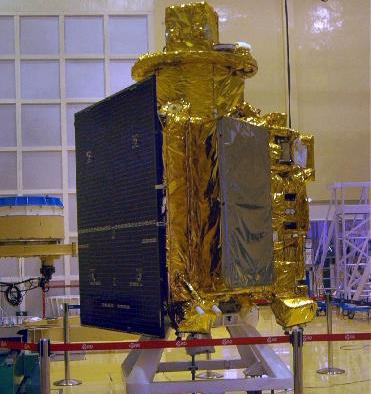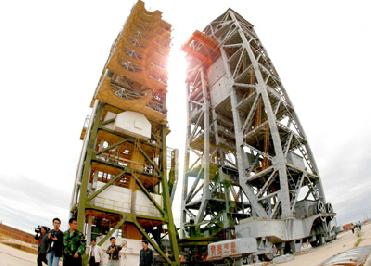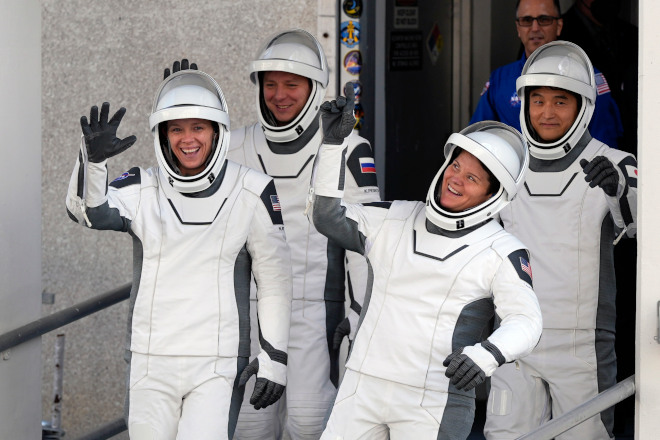
NEW DELHI (BNS): As China plans to hold its first spacewalk this week, its true opponent in the space race is not the west so much as its Asian neighbours, especially India, according to the American Newsweek magazine.
In a detailed report on China's proposed spacewalk, the magazine says, "China sees its spacewalk as a way of proving that it belongs with the United States and Russia in the top tier of space-faring nations. But its true opponent in this space race is not the West so much as its Asian neighbors�India in particular."
It points out that India has in recent years transformed its space program from a "utilitarian affair of meteorological and communications satellites into a hyperactive project that seems designed to make a splash on the world stage." It draws attention to India's robotic-exploration programme, Chandrayaan, which is scheduled for launch on October 22. The mission will orbit the moon for two years.
Close on India, giving a race to China's ambition is Japan, which is considering expanding its "well-established (if less ambitious) space program�which includes research on the International Space Station and a respectable commercial satellite business�and exploring military applications," Newsweek says. "Against this backdrop, Beijing's dominance is not unshakable. Just as the Soviet Union's launch of its Sputnik satellite back in 1957 was only a fleeting victory, China's recent accomplishments have provided merely the opening salvos in a modern-day Asian space race," the magazine says.
The magazine says China's planned spacewalk will celebrate "another milestone on its long march to the moon this week in a PR extravaganza that will rival its Olympic performance a few weeks ago." The Long March II-F rocket will take off from the Jiuquan launch center in Gansu province with three astronauts on the communist country's third mission to low Earth orbit.
There would be a live broadcast of the launch and "heartwarming made-for-TV linkups between the crew and their families," the magazine says. After that the "ruggedly handsome Zhai Zhigang will open the hatch and emerge into outer space." It would be China's first spacewalk and "another step in its ambitious plan to build its own space station by 2015 and�if the rumors are true�to put astronauts on the moon by 2020," the magazine says.
On the race between China and India in space, the magazine says the "two biggest forces driving the race between China and India are their insistence on self-reliance and the idea that space exploration feeds national prestige. Naturally, the two ideas work in tandem."
The magazine points out how India was shut out from NASA and European space missions for years after testing its first nuclear bomb in 1974. Indian engineers developed many of the technologies for India's Chandrayaan mission with "little outside help," it points out.
Beijing's space programme "electrified the competition when astronaut Yang Liwei orbited the earth in October 2003," Newsweek says. Last year China shot down a weather satellite, adding an arms-race quality to the battle for prestige forcing America to retaliate in months.
The magazine says China is now constructing its fourth launch base on Hainan Island for a "new 25-ton booster rocket that will carry aloft modules for its space station, which will be permanently staffed."
It says there are plans for robotic moon landings and "even a rumored manned trip to the lunar surface."
Despite technology export controls imposed by the US, China's commercial satellite business is booming: It has launched 79 satellites altogether�10 of them in 2007, the report points out. This year India has launched 11 satellites, including nine from other countries. And it became the first nation to launch 10 satellites on one rocket, the report points out.
"The United States and the Soviet Union were racing in the context of a cold war, but India and China are vying for leadership in a competitive marketplace of people and knowledge industries. It's about developing technology, talent and markets. All of which has stimulated Chinese technology: sensors built for space have ended up in GPS systems, washing machines and other products. The Chinese hope to spin out their rockets and orbiters into inventions and products they can patent," the report says.
 Next Article
Next Article













The Indian Air Force, in its flight trials evaluation report submitted before the Defence Ministry l..
view articleAn insight into the Medium Multi-Role Combat Aircraft competition...
view articleSky enthusiasts can now spot the International Space Station (ISS) commanded by Indian-American astr..
view article